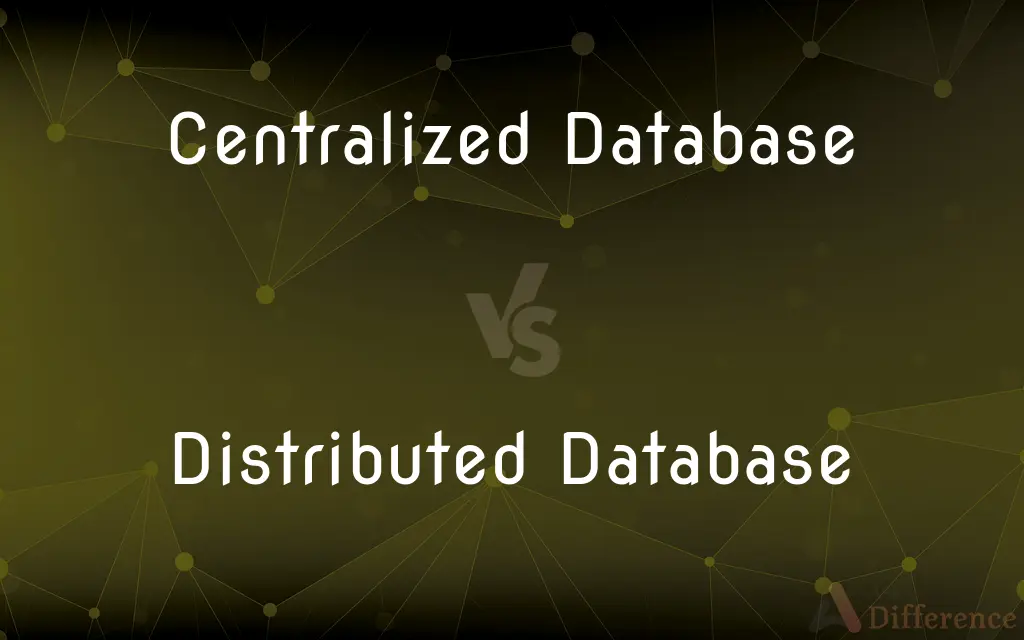Centralized Database vs. Distributed Database — What's the Difference?
By Tayyaba Rehman — Published on November 2, 2023
Centralized Database stores data in a single location, while Distributed Database stores data across multiple connected locations or nodes.

Difference Between Centralized Database and Distributed Database
Table of Contents
ADVERTISEMENT
Key Differences
Centralized Database and Distributed Database, both crucial in data management, operate with divergent data storage mechanisms and architectures. Centralized Database consolidates all its data into a singular physical location, providing a unified, centrally managed and accessed data repository. Conversely, Distributed Database disseminates its data across several locations, whether they are computers, networks, or regions, thereby permitting localized access and management of data, ensuring that the system remains robust and can continue to function even if a particular node fails.
From an architectural lens, Centralized Database emphasizes a single, often potent, computing node that houses and manages all of the data and computational resources, making it potentially a single point of failure. In contrast, Distributed Database, through its multi-node architecture, eliminates the bottleneck and single-point-of-failure risks associated with centralized systems by having numerous nodes each capable of performing computations and holding data, which also aids in reducing the load on the network since data can often be accessed from a nearby node.
Centralized Database typically exhales an aura of simplicity in terms of data management, backup, and recovery, given that all data is stored and managed from a single location, facilitating streamlined operations. In stark contrast, Distributed Database, while providing improved data availability and reliability, might ravel developers and IT professionals into a web of complexity due to the multifaceted nature of managing, maintaining, and backing up data across several locations, ensuring consistency and managing transactions which may span multiple nodes.
Through the lens of data accessibility and network load, Centralized Database, being a single-point data hub, might pose challenges in accessibility for remote users and can be subjected to substantial network load, especially in scenarios of voluminous data requests. On the other hand, Distributed Database ensures that data can be accessed from multiple points, potentially reducing network load and enhancing accessibility for users as they might access data from a nearby node, which particularly shines in a geographically dispersed user base.
Data security and integrity, while paramount in both, experience diverse challenges and implementations across Centralized Database and Distributed Database. The Centralized Database requires a fortified security mechanism at a single point, but any breach into the system could expose all stored data. On a different plane, Distributed Database, while scattering the data, may limit exposure in case of a breach, yet demands an intricate security mechanism spread across all nodes, necessitating a well-woven, secure network that ensures data consistency and integrity across all nodes.
ADVERTISEMENT
Comparison Chart
Location of Data Storage
Single location
Multiple, connected locations
System Architecture
Single-node system
Multi-node system
Accessibility and Load
Potentially limited accessibility and high network load
Enhanced accessibility and distributed network load
Data Management Complexity
Generally straightforward and centralized
Can be complex due to multiple nodes and locations
Data Security Approach
Fortified security at a single point
Intricate, networked security across all nodes
Compare with Definitions
Centralized Database
Unified Data Management
Managing backups is straightforward with our Centralized Database.
Distributed Database
Multiple Access Nodes
The Distributed Database allows users to access data from multiple, networked access points.
Centralized Database
Single-Location Repository
All our customer data is safely stored in a Centralized Database.
Distributed Database
Enhanced Availability System
Despite a server failure in Asia, our Distributed Database ensured continuous data availability.
Centralized Database
Single-Node System
Our Centralized Database experienced downtime due to maintenance of its lone server.
Distributed Database
Multi-Location Storage
Our user data is stored in a Distributed Database spanning several regions for localized access.
Centralized Database
Simplified Data Handling
Employing a Centralized Database, we ensure cohesive data management and uniform security protocols.
Distributed Database
Networked Data Protocol
The Distributed Database follows a comprehensive, network-wide security protocol to safeguard data across all nodes.
Centralized Database
Central Access Point
The Centralized Database serves as our singular data access hub for all departments.
Distributed Database
Decentralized Data Management
We manage backups regionally in our Distributed Database to ensure localized data safety.
Common Curiosities
What is a Centralized Database?
A Centralized Database stores all its data in a single, central location.
Why might one opt for a Distributed Database?
For enhanced data availability, reliability, and potentially reduced network load across a geographically diverse user base.
Is data recovery easier in a Centralized Database?
Typically yes, due to the singular location of data.
How does a Distributed Database protect data across its nodes?
Through a networked security protocol, ensuring each node is secure and data is consistent across the network.
How does a Distributed Database store data?
A Distributed Database stores data across multiple, interconnected nodes or locations.
What are the complexities of managing a Distributed Database?
Managing data consistency, handling transactions, and ensuring security across multiple nodes can be complex.
What could be a drawback of Centralized Database regarding data security?
If breached, all data, being in a single location, could be exposed.
Can Centralized Database handle large-scale data?
Yes, but it might face challenges in accessibility and network load, especially for remote users.
How does a Distributed Database enhance data accessibility?
By allowing data to be accessed from nearby nodes, reducing latency and potentially lowering network traffic.
Is a Centralized Database prone to network bottlenecks?
It can be, especially with a large number of remote users or voluminous data requests.
How is data consistency maintained in a Distributed Database?
Through protocols ensuring all nodes update one another and maintain uniform, synchronized data.
Can Centralized Database and Distributed Database be used simultaneously?
Hybrid approaches can be implemented, utilizing both for different purposes within the same organization.
How does data management in a Centralized Database compare to a Distributed Database?
Centralized Database management is typically simpler due to a single location, while Distributed Database management can be more complex due to multiple nodes.
Is a Centralized Database suitable for global companies?
It depends on specific needs, but global entities might benefit more from a Distributed Database for improved local data access.
Can a Distributed Database operate if a node fails?
Yes, the rest of the nodes can continue functioning, ensuring data availability.
Share Your Discovery

Previous Comparison
White-Collar Crime vs. Blue-Collar Crime
Next Comparison
Daycare vs. DayhomeAuthor Spotlight
Written by
Tayyaba RehmanTayyaba Rehman is a distinguished writer, currently serving as a primary contributor to askdifference.com. As a researcher in semantics and etymology, Tayyaba's passion for the complexity of languages and their distinctions has found a perfect home on the platform. Tayyaba delves into the intricacies of language, distinguishing between commonly confused words and phrases, thereby providing clarity for readers worldwide.













































